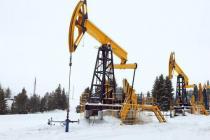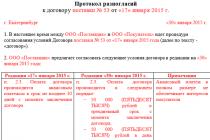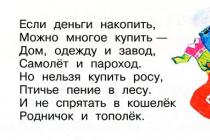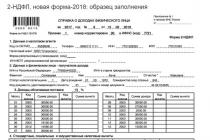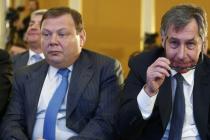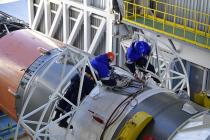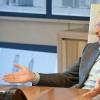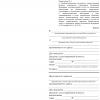Economic activity
Most people work to earn their living.
They produce goods and services. Goods are either produced on farms, such as corn and milk, or in factories, such as cars and paper. Services such as schools, hospitals and shops provide services. Some people provide goods, some provide services. Other people provide both goods and services. For example, in the same garage, a person can buy a car, or he can buy some service that helps him maintain his car.
The work that people do is called their economic activity. Economic activity constitutes the economic system. The economic system is the sum total of what people do and want. The work people take on provides what they need or provides them with money. People buy essential goods with money.
Limits of economic freedom
A person is economically free if he can do what he wants with his property, time and effort. In all communities, of course, there are restrictions on this personal freedom. In some countries these restrictions are complex; In others, they are relatively simple.
All individual citizens must comply with the laws of their governments. Complete economic freedom of action can cause great difficulties, since the freedoms of various individuals will conflict. If the citizens were completely free, some landowners might build factories in inappropriate places. If there were no control system in place, manufacturers could force their employees to work too long each day.
If they were completely free, workers could stop working when they get their first paycheck and only come back to do more work when they need more money. Such economic freedom can create a very unstable economy. Laws relating to economic conditions sometimes deal with workers' health, wages and pensions. Sometimes they concern contracts between employers and employees. Sometimes they are related to the location of work places. Sometimes they help employers; Sometimes they protect the interests of the workers.
Microeconomics and Macroeconomics
Economics as a science consists of two disciplines, i.e. microeconomics and macroeconomics.
Microeconomics is the branch of economics that studies individual producers, consumers, or markets. It is associated with scarcity, choice and opportunity cost, as well as with production and consumption. Microeconomics also studies how government activities such as regulation and taxes affect individual markets. In addition, microeconomics tries to understand what factors affect prices, wages and earnings. Microeconomics focuses on the study of prices and their relationship with the units of the economy.
Macroeconomics is the branch of economics that studies the economy as a whole. It addresses issues such as the speed of the economy; What total output is generated; How much total income. He is also looking for solutions to macroeconomic problems such as increasing employment, as well as what can be done to increase the output of goods and services. He is trying to understand the whole picture, not its small parts. In particular, he studies the general values of production, unemployment and inflation.
Economic strategies
Four Asian countries - Hong Kong, Singapore, South Korea and Taiwan - are now called NIEs, Newly Industrialized Countries. Their new status is the product of development-oriented development strategies. In the 1950s and 1960s, four governments protected domestic markets from foreign competition in order to encourage domestic production for domestic consumption. Taiwan was the first to replace domestic policy oriented with foreign policy oriented. Three other countries followed closely. Soon, each country experienced rapid growth in exports and national income.
These countries retain some restrictions on the domestic economy, but operate with a different set of rules for exporting companies. Production for export takes place in a free market environment, with no taxes or restrictions on the import of materials needed to produce goods for export. Governments have developed banking and financial institutions that can finance exports and sales.
Why study economics?
You may be asking yourself, "Why should I study economics?" There are several very good reasons, all of which are related to you. Some of them are related to you as a person, others to you as a breadwinner and spender, and some to you as a citizen. As a member of the society in which you live, you cannot exist without economic
knowledge. The food you eat, the house you live in, the clothes you wear and how you spend your leisure time all depend on economic factors. Studying economics will help you better understand these forces and enable you to live a fulfilling life. Economic forces also influence decisions in the business world. In fact, one common definition of economics is "the study of how people make a living". The more you know about a subject, the better you will be able to make a career decision. The economy will also help you fulfill your responsibilities as a citizen in a democracy. Unlike other countries where government officials or dictators assume sole control over the affairs of the nation, truly democratic countries expect their citizens to participate in the running of the country. As a voter, you will be asked to give your opinion on many issues related to economic issues. Studying economics will help you deal with these questions intelligently.
Economics
Economics is a science. This science is based on the facts of our daily life. Economists study our daily lives. They study the system that affects our lives. The economist tries to describe the facts of the economy in which we live. He tries to explain how the system works. His methods must be objective and scientific.
We need food, clothing and shelter. If we could get food, clothing, and housing without a job, we probably wouldn't be working. But even when we have these essential things, we may want other things. If we had them, these other things (such as radios, books, and toys for children) could make life more enjoyable. The science of economics is connected with all our material wants and needs. This does not only apply to basic needs such as food, clothing and shelter.
economic system
Most people make a living, produce goods and services. Goods are either agricultural (eg corn and milk) or manufactured (eg cars and paper). Services are things like education, medicine, and trade. Some people provide goods; Some people provide services. For example, in the same garage, a person can buy a car and some maintenance that helps him maintain his car.
People call work an economic activity. All economic activity together makes up the economic system of a city, city, country, or world. Such an economic system is the sum of what people do and what they want. Workers either take on what they need or provide money with which they can buy basic necessities. Of course, most people hope to earn enough money to buy goods and services that are not essential but provide some personal satisfaction, such as toys for children, going to the movies, and books.
economic science
Economics is based on the facts of our everyday life. Economists study our daily lives and the general life of our communities in order to understand the entire economic system of which we are a part. They try to describe the facts of the economy we live in and explain how it works. The methods of the economist must, of course, be strictly objective and scientific.
We need food, clothing and shelter. We probably wouldn't go to work if we could meet these basic needs without working. But even when we are satisfied with such basic needs, we may still want other things. Our life can be more enjoyable if we have things like radios, books and toys for children. People certainly have a wide and very complex range of desires. The science of economics is connected with all our material wants and needs.
Western European countries
The countries of Western Europe underwent radical political and economic changes in the 1990s as they began to move from state control of the economy to free markets. In response, firms in the rest of the world began to look for new opportunities in Eastern Europe. They evaluate various countries in terms of current good growth opportunities and government attitudes towards foreign investors.
For example, the Hungarian government actively attracts foreign investors. Foreigners can purchase less than 50 percent from a firm that has not received government approval. With approval, foreigners can own 100 percent. In Poland, labor is inexpensive and the government welcomes foreign investors by giving them 100 percent ownership and the same rights as Polish citizens. The weak macroeconomic condition of the economy lowers the assessment.
mixed economy
A mixed economy is an economy that has the characteristics of more than one system. There can be both private and state property. There may also be joint ownership of government-provided resources. Mixed economies answer basic economic questions partly through the market and partly through government, with some decisions based on tradition. In many countries it has been found necessary to control or regulate national economic conditions. Even the most dedicated free enterprise systems like the US have felt this need. The underdeveloped countries of the world are usually interested in control and long-term planning. Countries like India had a number of government-focused plans. On the other hand, India makes a distinction between the public sector of the economy, on the one hand, and the private sector.
The UK today has a mixed economy. In the public sector of British economic life are nationalized industries such as coal and steel, British
Overseas Airlines Corporation. The private sector is dominated by most of the country's industries, both large and small. The private sector includes such giant companies as Imperial Chemical Industries" -
Imperial Chemical Trust (the largest chemical concern in the UK and Western Europe) and British Petroleum” - British Oil Company The first socio-economic formations, as well as many small family businesses.
In 1962, the government created an official planning body to guide national economic policy. This body is called the National Economic Development Council. The members of this council are representatives of employers, employees and other stakeholders.
The first socio-economic education there was a primitive communal system that covered a period of many hundreds of years. At first, people were in a semi-wild situation, powerless before nature. They collected nuts, wild fruits and berries, roots and plants. Man's first tools were roughly chipped with stones and sticks. Later, people learned to make the simplest tools. The basis of production relations was communal ownership of primitive tools and means of production. People lived together in communes. With the development of animal husbandry and agriculture, a social division of labor arose: cattle breeding was separated from agriculture. This led to an increase in productivity and the growth of productive forces.
The productive forces continued to expand, and man began to produce more. It became possible to use the workers received as a result of the war. Captured prisoners became slaves. This was followed by the first division of society into classes known as slavery. Slave owners possessed both the means of production and the people involved in production. The ancient world made significant progress in the economy and culture. But time passed, and the need arose to replace slaveholding relations: a new feudal mode of production began to take shape.
| Economic Activities Most people work to earn a living. They produce goods and services. Goods are either produced on farms, such as corn and milk, or in factories, such as cars and paper. Services such as schools, hospitals and shops provide services. Some people provide goods, some provide services. Other people provide both goods and services. For example, in the same garage, a person can buy a car, or he can buy some service that helps him maintain his car. The work that people do is called their economic activity. Economic activity constitutes the economic system. The economic system is the sum total of what people do and want. The work people take on provides what they need or provides them with money. People buy essential goods with money. | Limits of Economic Freedom A man is economically free if he can do what he wants with his property, time and effort. In all communities, of course, there are restrictions on this personal freedom. In some countries these restrictions are complex; In others, they are relatively simple. All individual citizens must comply with the laws of their governments. Complete economic freedom of action can cause great difficulties, since the freedoms of various individuals will conflict. If the citizens were completely free, some landowners might build factories in inappropriate places. If there were no control system in place, manufacturers could force their employees to work too long each day. If they were completely free, workers could stop working when they get their first paycheck and only come back to do more work when they need more money. Such economic freedom can create a very unstable economy. Laws relating to economic conditions sometimes deal with workers' health, wages and pensions. Sometimes they concern contracts between employers and employees. Sometimes they are related to the location of work places. Sometimes they help employers; Sometimes they protect the interests of the workers. |
| Microeconomics and Macroeconomics Economics as a science consists of two disciplines, ie microeconomics and macroeconomics. Microeconomics is the branch of economics that studies individual producers, consumers, or markets. It is associated with scarcity, choice and opportunity cost, as well as with production and consumption. Microeconomics also studies how government activities such as regulation and taxes affect individual markets. In addition, microeconomics tries to understand what factors affect prices, wages and earnings. Microeconomics focuses on the study of prices and their relationship with the units of the economy. Macroeconomics is the branch of economics that studies the economy as a whole. It addresses issues such as the speed of the economy; What total output is generated; How much total income. He is also looking for solutions to macroeconomic problems such as increasing employment, as well as what can be done to increase the output of goods and services. He is trying to understand the whole picture, not its small parts. In particular, he studies the general values of production, unemployment and inflation. | Economic Strategies Four Asian countries - Hong Kong, Singapore, South Korea and Taiwan - are now called NIEs, Newly Industrialized Countries. Their new status is the product of development-oriented development strategies. In the 1950s and 1960s, four governments protected domestic markets from foreign competition in order to encourage domestic production for domestic consumption. Taiwan was the first to replace domestic policy oriented with foreign policy oriented. Three other countries followed closely. Soon, each country experienced rapid growth in exports and national income. These countries retain some restrictions on the domestic economy, but operate with a different set of rules for exporting companies. Production for export takes place in a free market environment, with no taxes or restrictions on the import of materials needed to produce goods for export. Governments have developed banking and financial institutions that can finance exports and sales. |
| Why study economics? You may be asking yourself, "Why should I study economics?" There are several very good reasons, all of which are related to you. Some of them are related to you as a person, others to you as a breadwinner and spender, and some to you as a citizen. As a member of the society in which you live, you cannot exist without economic knowledge. The food you eat, the house you live in, the clothes you wear and how you spend your leisure time all depend on economic factors. Studying economics will help you better understand these forces and enable you to live a fulfilling life. Economic forces also influence decisions in the business world. In fact, one common definition of economics is "the study of how people make a living". The more you know about a subject, the better you will be able to make a career decision. The economy will also help you fulfill your responsibilities as a citizen in a democracy. Unlike other countries where government officials or dictators assume sole control over the affairs of the nation, truly democratic countries expect their citizens to participate in the running of the country. As a voter, you will be asked to give your opinion on many issues related to economic issues. Studying Economics Will Help You Handle These Questions Wisely | The Science of Economics Economics is a science. This science is based on the facts of our daily life. Economists study our daily lives. They study the system that affects our lives. The economist tries to describe the facts of the economy in which we live. He tries to explain how the system works. His methods must be objective and scientific. We need food, clothing and shelter. If we could get food, clothing, and housing without a job, we probably wouldn't be working. But even when we have these essential things, we may want other things. If we had them, these other things (such as radios, books, and toys for children) could make life more enjoyable. The science of economics is connected with all our material wants and needs. This does not only apply to basic needs such as food, clothing and shelter. |
| Economic system Most people make a living, produce goods and services. Goods are either agricultural (eg corn and milk) or manufactured (eg cars and paper). Services are things like education, medicine, and trade. Some people provide goods; Some people provide services. For example, in the same garage, a person can buy a car and some maintenance that helps him maintain his car. People call work an economic activity. All economic activity together makes up the economic system of a city, city, country, or world. Such an economic system is the sum of what people do and what they want. Workers either take on what they need or provide money with which they can buy basic necessities. Of course, most people hope to earn enough money to buy goods and services that are not essential but provide some personal satisfaction, such as toys for children, going to the movies, and books. | Economic Science Economic science is based on the facts of our everyday life. Economists study our daily lives and the general life of our communities in order to understand the entire economic system of which we are a part. They try to describe the facts of the economy we live in and explain how it works. The methods of the economist must, of course, be strictly objective and scientific. We need food, clothing and shelter. We probably wouldn't go to work if we could meet these basic needs without working. But even when we are satisfied with such basic needs, we may still want other things. Our life can be more enjoyable if we have things like radios, books and toys for children. People certainly have a wide and very complex range of desires. The science of economics is connected with all our material wants and needs. |
| Western European Countries Western European countries underwent radical political and economic changes in the 1990s as they began to move from state control of the economy to free markets. In response, firms in the rest of the world began to look for new opportunities in Eastern Europe. They evaluate various countries in terms of current good growth opportunities and government attitudes towards foreign investors. For example, the Hungarian government actively attracts foreign investors. Foreigners can purchase less than 50 percent from a firm that has not received government approval. With approval, foreigners can own 100 percent. In Poland, labor is inexpensive and the government welcomes foreign investors by giving them 100 percent ownership and the same rights as Polish citizens. The weak macroeconomic condition of the economy lowers the assessment. | Mixed economy A mixed economy is an economy that has the characteristics of more than one system. There can be both private and state property. There may also be joint ownership of government-provided resources. Mixed economies answer basic economic questions partly through the market and partly through government, with some decisions based on tradition. In many countries it has been found necessary to control or regulate national economic conditions. Even the most dedicated free enterprise systems like the US have felt this need. The underdeveloped countries of the world are usually interested in control and long-term planning. Countries like India had a number of government-focused plans. On the other hand, India makes a distinction between the public sector of the economy, on the one hand, and the private sector. The UK today has a mixed economy. In the public sector of British economic life are nationalized industries such as coal and steel, the British Overseas Airways Corporation. The private sector is dominated by most of the country's industries, both large and small. The private sector includes giants such as Imperial Chemical Industries, the Imperial Chemical Trust (the largest chemical concern in the UK and Western Europe) and British Petroleum, the first socio-economic formations, as well as many small family businesses. In 1962, the government created an official planning body to guide national economic policy. This body is called the National Economic Development Council. The members of this council are representatives of employers, employees and other stakeholders. |
| The first socio-economic formation was the primitive communal system, which covered a period of many hundreds of years. At first, people were in a semi-wild situation, powerless before nature. They collected nuts, wild fruits and berries, roots and plants. Man's first tools were roughly chipped with stones and sticks. Later, people learned to make the simplest tools. The basis of production relations was communal ownership of primitive tools and means of production. People lived together in communes. With the development of animal husbandry and agriculture, a social division of labor arose: cattle breeding was separated from agriculture. This led to an increase in productivity and the growth of productive forces. The productive forces continued to expand, and man | started making more. It became possible to use the workers received as a result of the war. Captured prisoners became slaves. This was followed by the first division of society into classes known as slavery. Slave owners possessed both the means of production and the people involved in production. The ancient world made significant progress in the economy and culture. But time passed, and the need arose to replace slaveholding relations: a new feudal mode of production began to take shape. |
1. Think and write down why you need knowledge about economics.
I need the economy in order to be able to spend my money correctly. Then, when I grow up and live on my own, it will be very useful to me.
2. Make a list of your needs. Underline the ones you think are the most important.
Clothes, shoes, food, water, summer vacation, school supplies, bed, table, wardrobe, ball, skates, etc.
Compare your records with the records of other guys.
3. Seryozha and Nadia's mother found a poem by V. Orlov in one of the books, which she really liked. Read it on p. 23-24. Explain why it fits the topic of today's lesson.

Write what else you can not buy.
You can't buy friendship, love, the beauty of the ocean, pine air in the forest, a sunset, talent, and much more.
4. Use the textbook to complete the definitions.
Goods - these are things, objects with the help of which people satisfy their needs for food, clothes, shoes.
Services - it is the work that people do to satisfy the needs of other people, for example, a haircut at a hairdresser, repairing household appliances.
5. Give examples of various goods and services (fill in the table).

6. And this task was invented by Seryozha and Nadia's dad. Consider the drawings. Mark (fill in the circle) the goods in red and the services in green. Match the product and service with a line.

Ask a student sitting next to you to check your work.
7. As instructed by the textbook, write down what goods you purchased during the day and what services you used.
Goods: bread, milk, yogurt, mineral water, cheese, bus ticket, envelope, stamp
Services: seller, post office, bus driver
There is no unanimous opinion on this matter. Everyone has their own view on the concept of the economy and how to apply it in everyday life, based on their personal experience.
A person who has first-hand experience with economics in the course of performing his professional duties will argue that this is the science of the process of spending resources by society. The philosopher will not agree with this point of view and will say that these are special psychological features of human consciousness in the sphere of production. A true housewife will answer in a simple, but also correct way: economics is the ability to manage a household in a sensible and wasteful way. The student will assume that this is an important and irreplaceable area of human life.
Wikipedia writes: economics involves a variety of types of social life, while exploring the effective planning, exchange and consumption of products of production by the population.
So where did the economy come from?
The phenomenon of the economy has come to us since time immemorial, when money and monetary systems have not yet been invented. Its birth took place when people began to engage in animal husbandry and agriculture and the resulting products were exchanged for those that they needed more. Not a single day in the modern information world goes by without mentioning economic issues in the print press, news on television and radio, even in films sometimes this is given attention. Is it possible to do without the economy?
The fact is, and it's no secret, that every person has a range of needs. Basic - food, drink, clothing, shelter. When they are satisfied, new needs appear that are common to a number of other people. For example, urban residents need transport to move, hospitals need medicines. So you can list for a long time. With the help of the economy, it becomes possible to satisfy the needs that have arisen.

How exactly does the economy work?
Let's take a real and understandable example for everyone. The hospital needs medicines that are purchased with money. However, in order to obtain a drug, it is necessary to purchase raw materials extracted from natural components or through the activities of the medical-chemical industry. All of these elements are called resources, which, in turn, are limited. It is the economy that helps to distribute these resources ergonomically and efficiently so that they are enough for everything and everyone.
So, the conclusion suggests itself - economic activity allows you to constructively make decisions about the expenditure of resources, making a person's life as comfortable as possible.
Every year at the beginning of the school year, discussions flare up about the practicality and appropriateness of school educational programs. For example, is it mandatory for schoolchildren to study economics? Or should it be moved to the category of elective courses, which are consciously chosen only by those who plan to connect their lives with work in business and in the field of finance? We decided to look into this issue in more detail.
What is an economy?
Economics is a science primarily about the relationship between people who need to make decisions in conditions of limited resources. The concept of "resources" includes not only money, it is also the time spent on certain tasks, intellectual capital (human knowledge and its value). Every Russian schoolchild encounters economic relations every day: buying juice in the school cafeteria is already an economic transaction, and it is subject to basic economic laws.
How do Russian schoolchildren study economics?
In Russia, economics is not a compulsory general education subject, and it is not included in the USE. At its discretion, it is included in the program of individual colleges, lyceums and even ordinary schools in specialized classes, in which students are prepared for admission to financial and economic specialties at universities. As a rule, schools do not open separate vacancies for teachers of economics, and this subject is taught by teachers of related courses.
The course of economic knowledge, which is taught in general education schools, is simplified as much as possible, it gives an idea of the basic concepts and practically does not concern deep mathematical calculations. At the same time, it is understandable and simple, allowing the student to become interested in this science, to get an idea of how economic laws work in real life.
Why study economics?
Economics allows you to get a clear idea of how the world works. Why have food prices risen? How will the jump in the national currency affect the family budget? Why did Katya and Masha get the same grades at school, but Katya's salary is barely enough to live on, and Masha goes on holiday abroad three times a year? People who have no idea about the market will say: "Lucky." But in fact, this is an elementary economic law: Masha, as a specialist, sold herself and her knowledge more expensively. Someone looks at Unicredit vacancies with envy and thinks that he will never be able to receive such money. But the reason is that the person himself refused to invest in his education. After all, obtaining knowledge is also an investment in oneself, that is, economic relations.
Unfortunately, we have to state that the majority of the Russian population is economically illiterate. And this leads to big problems: people simply do not know how to plan their budget, take loans from banks, cannot pay them off and become bankrupt.
Practical application of economic knowledge
Learning how to use economic knowledge consciously is very important. Moreover, in practice it is easier to understand the theoretical material. For example, the concept of "passive income" is not given to schoolchildren so easily. But if you invite a child to put away pocket money not in a piggy bank, but on a deposit (you can agree with parents on the payment of “interest”, that is, involve them in an exciting economic game), he will see that passive income is profitable, and money works on its own on their own, and the child receives a financial benefit. In the future, this motivates an already adult person to look for opportunities for passive income and investment - and both he and the country's economy will benefit from this.
Or start a financial diary and write down all the expenses, and then cross out the items that you can refuse and instead buy something really necessary and useful. For example, if you give up soda for a week, then you can buy a T-shirt with a fashionable print that you wanted so much, but your parents refused. Teenagers, and most adults, simply do not understand how much various useless purchases of goods “eat up”, which, it would seem, cost a little, but with their daily consumption, a huge amount comes out. There are many such examples.
A year after leaving school, yesterday's schoolchildren, according to the law, become fully grown - they receive full legal capacity and already independently manage their finances. They will make money and spend it - so it is very important to teach them how to do it right.
And instead of concluding
You need to study economics in school. But this should be a course for high school students who are already old enough and logically thinking. And the course itself should not be a boring presentation of theoretical material, but practical - with financial games, tasks and trainings. Then schoolchildren will not only fall in love with the economy, but also understand it and apply knowledge in real life.
Essay on the topic: Why do I need an economy?
Never before have I had to deal with this question, and in order to answer it myself, I first need to understand what the word economics means and where it came from.
Word economy came from Greekοikos- house and nomos- law, literally - the rules of housekeeping.
Each person has his own needs: they are mainly spiritual, material and social. Now a person tries to satisfy these needs, no matter what kind of activity he is engaged in or in what part of the world he lives. A person is already used to living in comfort and coziness in what he wears. needed the benefits that he provides for himself. It turns out that each person is engaged in “running his own household” and each in his own way ... Starting from primitive tools of labor ending with factories, various equipment, etc. a person began to seek his self-realization, his own good for his own sake. Cooperation with each other has led man to economic activities such as trade, business, money, etc. That is, what we do in everyday life is an integral part of the economy, with which we are closely connected.
Economics plays an important role in my profession. because very closely related to trade. For example: in order for me to do a certain job, paints will be required. But for this it is necessary for someone to produce paints and build a building where there will be a store in which they will be sold. And the more different colors and different stores there are, the more choice I have where I can buy them so that I can also save money. Thus, I can satisfy my needs and benefit myself in the form of money that I saved. Getting used to such forms of economic relations between people in everyday life, you don’t think that you are part of the process.

